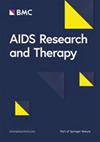一名艾滋病毒感染者的双灶恶性肿瘤:病例报告
IF 2.1
4区 医学
Q3 INFECTIOUS DISEASES
引用次数: 0
摘要
麦拉克氏病是一种罕见的慢性肉芽肿性疾病,其特征是组织细胞聚集体内存在迈克尔斯-古特曼体(MGB)。它主要影响免疫力低下的人群,包括人类免疫缺陷病毒(HIV)感染者。我们报告了一例独特的双灶恶性肿瘤病例,患者是一名 49 岁的男性,曾患 2019 年冠状病毒病(COVID-19),HIV 阳性,表现为呼吸道症状、体重减轻和淋巴结肿大。他曾感染过多种疾病,包括非结核分枝杆菌(NTM)、巨细胞病毒(CMV)和念珠菌,肺部和胃肠道问题不断恶化。尽管进行了各种治疗,但由于呼吸窘迫、多器官功能衰竭和凝血功能障碍,他的病情不断恶化,最终不幸去世。本报告介绍了一例独特而复杂的 HIV 阳性患者恶性肿瘤病例,这是一种罕见的炎症性疾病,最初由 Michaelis 和 Gutmann 于 1902 年描述。该病例观察到了标志性的米凯利斯-古特曼有机体,从而确诊了该病。虽然恶性肿瘤通常会影响泌尿道,但这一病例表明恶性肿瘤能够在肺部、胃肠道等多个器官系统中表现出来。虽然大肠埃希菌是一种常见的相关病原体,但确切的病因仍然难以捉摸。治疗通常涉及手术切除和抗生素治疗,这凸显了在免疫力低下的人群中治疗这种疾病的挑战性。本文章由计算机程序翻译,如有差异,请以英文原文为准。
Bifocal malakoplakia in a patient living with HIV: case report
Malakoplakia is a rare chronic granulomatous disease characterized by the presence of Michaelis-Gutmann bodies (MGBs) within histiocytic aggregates. It predominantly affects immunocompromised individuals, including those living with Human Immunodeficiency Virus (HIV). We present a unique case of bifocal malakoplakia in a 49-year-old man, previously with Coronavirus disease 2019 (COVID-19) and HIV positive, presented with respiratory symptoms, weight loss, and lymphadenopathy. He had various infections including Non-Tuberculous Mycobacteria (NTM), Cytomegalovirus (CMV), and Candida, with evolving lung and gastrointestinal issues. Despite treatment attempts, he deteriorated due to respiratory distress, multi-organ failure, and coagulopathy, leading to his unfortunate demise. This report presents a distinctive and complex case of malakoplakia in an HIV-positive patient, a rare inflammatory disorder originally described by Michaelis and Gutmann in 1902. The hallmark Michaelis-Gutmann organisms were observed, confirming the diagnosis. While typically affecting the urinary tract, this case demonstrates the exceptional ability of malakoplakia to manifest in various organ systems, including pulmonary, gastrointestinal, and more. Although Escherichia coli is a prevalent associated pathogen, the exact cause remains elusive. Treatment, often involving surgical excision and antibiotic therapy, underscores the challenging nature of managing this condition in immunocompromised individuals.
求助全文
通过发布文献求助,成功后即可免费获取论文全文。
去求助
来源期刊

AIDS Research and Therapy
INFECTIOUS DISEASES-
CiteScore
3.80
自引率
4.50%
发文量
51
审稿时长
16 weeks
期刊介绍:
AIDS Research and Therapy publishes articles on basic science, translational, clinical, social, epidemiological, behavioral and educational sciences articles focused on the treatment and prevention of HIV/AIDS, and the search for the cure. The Journal publishes articles on novel and developing treatment strategies for AIDS as well as on the outcomes of established treatment strategies. Original research articles on animal models that form an essential part of the AIDS treatment research are also considered
 求助内容:
求助内容: 应助结果提醒方式:
应助结果提醒方式:


